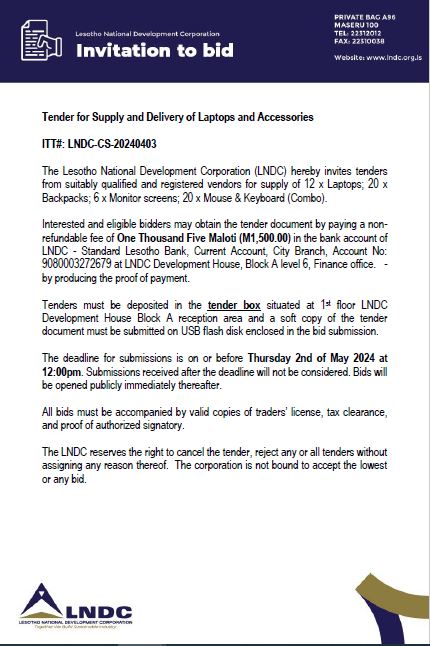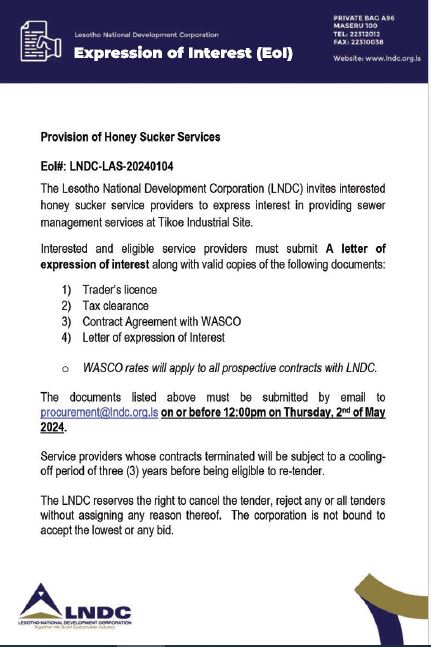Ntsoaki Motaung
His Majesty King Letsie III who is also the African Union (AU) nutrition champion has called on African governments to accelerate the implementation of the Continental Free Trade Area (AfCFTA).
The king made the clarion call during his keynote address at the high-level dialogue on nutrition financing held at Manthabiseng Convention Centre in Maseru recently.
He said AfCFTA would provide an opportunity for the African continent to improve nutrition and food security by eliminating tariffs on inter-African trade.
It will also facilitate increased access to nutritious food produced by African farmers, he further said.
The 18th ordinary session of the assembly of heads of state and government of the African Union, held in Addis Ababa, Ethiopia in January 2012, adopted a decision to establish AfCFTA by an indicative date of 2017.
The Summit also endorsed the Action Plan on Boosting Intra-Africa Trade (BIAT) which identified seven clusters: trade policy, trade facilitation, productive capacity, trade-related infrastructure, trade finance, trade information, and factor market integration.
The AfCFTA, according to the AU, would bring together fifty-four African countries with a combined population of more than one billion people and a combined gross domestic product of more than US $3.4 trillion.
The main objectives of the AfCFTA are to create a single continental market for goods and services, with free movement of business persons and investments, and thus pave the way for accelerating the establishment of the Customs Union.
It will also expand intra-African trade through better harmonization and coordination of trade liberalization and facilitation and instruments across the RECs and across Africa in general.
The AfCFTA is also expected to enhance competitiveness at the industry and enterprise level through exploitation of opportunities for scale production, continental market access and better reallocation of resources.
His Majesty told the high-level dialogue last week that both the continental nutrition accountability score card and the comprehensive Africa agriculture development biannual report showed that Africa was making some progress towards achieving the global nutrition targets and the malleable of ending hunger and all forms of malnutrition by 2025.
The King, however, indicated that although the progress was commendable it was not enough.
“We greatly need to increase our efforts in this battle against malnutrition, if we are to meet or even come close to meeting 2025 targets,†he said.
He further stated that the scorecard showed that stunting levels degreased from 32 percent in 2012 to 27 percent in 2020 but with only five countries on course to meet the target of reducing stunting amongst children below the years of five.
“Wasting prevalence has also decreased from seven percent in 2012 to five percent in 2020 with 19 countries on course of maintaining the prevalence of wasting to below five percent, while exclusive breastfeeding increased from 36 percent in 2012 to 44 percent in 2020 and 20 countries are on course to meet the target for exclusive breastfeeding amongst children during the first six months,†he said.
He also showed concern that not a single country in Africa was on course to achieve the target relating to reduction of anaemia in women of reproductive age, obesity among women and low birth weight.
His Majesty said he was also disturbed to learn that the reports showed that a vast majority of countries on the continent were not on track to meet the targets of ending hunger and all forms of malnutrition by 2025.
He revealed that the 2022 global nutrition report on stronger commitments for greater action reviewed 433 financial commitments to nutrition made by 198 stakeholders which included governments, civil society organisations, private sector, donors, international organisations, and academia.
He said these commitments amounted to US $42.6 billion and the review targeted mostly countries in south Asia and Africa.
“Over half, 61 percent of the commitments were from donor countries, followed by 31 percent from governments, 7 percent from international organisations and the remaining 1 percent from privet sector and civil society organisations,†he said.
According to his Majesty the results of the review showed that a significant proportion of commitments were aligned with key global nutrition targets on maternal, infant and young child nutrition while fewer commitments focus on improving food security.
“The results of the review also show a need for us to increase our efforts to attract greater financial engagement by private sector and civil society organisations,†he emphasised.
The United Nations (UN) resident coordinator, Amanda Khozi Mukwashi, told the same high-level meeting that the dialogue on nutrition financing came at a time when the world faced daunting economic, developmental, and existential challenges.
Mukwashi said Africa must first and foremost look internally to generate resources and create the fiscal latitude to finance its development agenda including nutrition, and food systems that are sustainable and that help accelerate community resilience and well-being.
“Achieving and sustaining nutrition progress in the continent requires investments, policy coherence, and coordinated action among multiple stakeholders, including leveraging communities, knowledge, and traditions of healthy food practices and across multiple sectors, including health, agriculture, social protection, education, and WASH,†she said.
She added: “In Lesotho, we are grateful and inspired by the leadership of His Majesty the King as the African Union Nutrition Champion and FAO Special Goodwill Ambassador for Nutrition.
She also welcomed the commitment of the government of Lesotho to drive forward policies that promote food security and nutrition for all.
“These are already influencing the agenda setting in the country. Moving from policy to practice is now needed to make a difference at household level, in every home, every village, every school, every health center, every district and every country on the continent,†she said.
She indicated that the UN in Lesotho remained committed to working with the government, civil society, the private sector, development partners to strengthen nutrition, food security, environmental sustainability.





